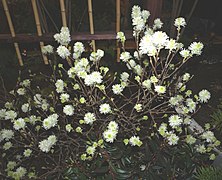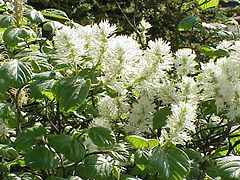Fothergilla major, the large witch alder or mountain witch alder, is a species of flowering plant in the genus Fothergilla, family Hamamelidaceae, that is native to woodland and swamps in the Allegheny Mountains and southern Appalachian Mountains of the southeastern United States.[3] It is a deciduous shrub growing to 2.5 m (8 ft 2 in) with fragrant white bottlebrush flowers appearing along with, or before, the glossy leaves. The leaves often turn brilliant shades of red and orange in autumn.[4]
| Fothergilla major | |
|---|---|

| |
| Scientific classification | |
| Kingdom: | Plantae |
| Clade: | Tracheophytes |
| Clade: | Angiosperms |
| Clade: | Eudicots |
| Order: | Saxifragales |
| Family: | Hamamelidaceae |
| Genus: | Fothergilla |
| Species: | F. major
|
| Binomial name | |
| Fothergilla major Lodd.
| |
| Synonyms[2] | |
| |
Fothergilla major prefers full sun to part shade and is disease and insect resistant.[5] It thrives in moist, acidic soils, but is fairly drought tolerant.[3] It is hardy in USDA hardiness zones 4–8.[6]
This plant is named for the English physician and plant collector John Fothergill (1712-1780). The Latin specific epithet major means "larger".[7] It has gained the Royal Horticultural Society's Award of Garden Merit.[8][9]
References
edit- ^ Fothergilla major NatureServe
- ^ "Fothergilla latifolia (Large Fothergilla, Large Witch-alder)". NC State Extensiona. Retrieved 25 February 2021.
- ^ a b "Fothergilla major - Plant Finder". www.missouribotanicalgarden.org. Retrieved 2021-02-25.
- ^ RHS A-Z encyclopedia of garden plants. United Kingdom: Dorling Kindersley. 2008. p. 1136. ISBN 1405332964.
- ^ "Lady Bird Johnson Wildflower Center - The University of Texas at Austin". www.wildflower.org. Retrieved 2021-02-25.
- ^ "Fothergilla latifolia (Large Fothergilla, Large Witch-alder) | North Carolina Extension Gardener Plant Toolbox". plants.ces.ncsu.edu. Retrieved 2021-02-25.
- ^ Harrison, Lorraine (2012). RHS Latin for gardeners. United Kingdom: Mitchell Beazley. p. 224. ISBN 9781845337315.
- ^ "Fothergilla major AGM". Royal Horticultural Society. Retrieved 5 July 2020.
- ^ "AGM Plants - Ornamental" (PDF). Royal Horticultural Society. July 2017. p. 39. Retrieved 27 February 2018.
External links
edit- Flint, Franklin F. (July 1957). "Megasporogenesis and Megagametogenesis in Fothergilla gardeni Murr. and Fothergilla Major Lodd". Transactions of the American Microscopical Society. 76 (3). Blackwell Publishing: 307–311. doi:10.2307/3223894.


